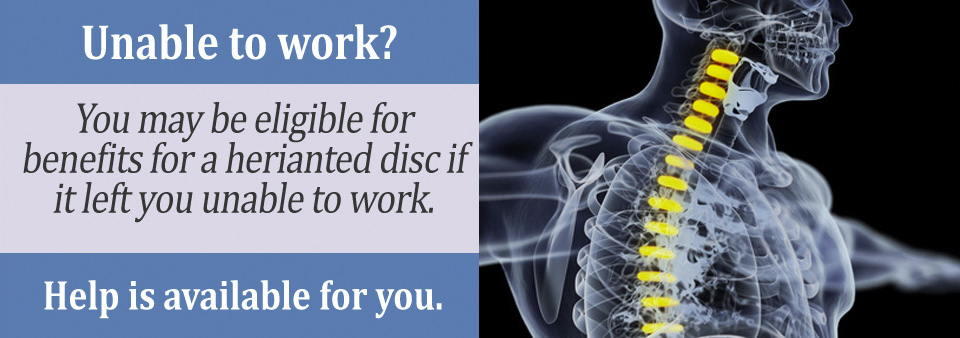Rubber-like cushions called discs absorb the pounding vertebrae take on a routine basis. When one or more discs slip or rupture, the medical condition called a herniated disc causes some of the shock-absorbent interior nucleus to push out through a tear in the annulus.
The result of a herniated disc typically is irritation to a nerve running up and down the spine. Many people that suffer from a herniated disc do not have any symptoms and surgery is not necessary for many patients to relieve the irritation.
If you suffer from a herniated disc, and you miss work because of it, you need to submit medical evidence to the Social Security Administration (SSA) to support your claim.
How Does a Herniated Disc Affect You in the Workplace?
Although many people that experience a herniated disc can continue to work, there are cases when the medical issue causes intense pain in one or more arms and legs. You also might experience intense pain in one foot or both feet, which might force you off your feet for hours at a time.
Most herniated disc disabilities occur in the lower back, although you can experience the symptoms of the medical condition in your neck. Pain, numbness, and/or weakness in the arms or legs can make it difficult for professionals to complete basic workplace tasks.
However, a herniated disc is especially troublesome for a worker who spends most of the workday on his or her feet.
Eligibility for Financial Relief
Serious cases of a herniated disc can keep professionals out of work for extended periods. In addition to paying for medical expenses, you also have to account for daily living costs like gas and groceries.
The SSA offers a disability benefits program called Social Security Disability Insurance (SSDI) to cover the costs associated with diagnosing, treating, and rehabilitating a herniated disc.
You submit a detailed application that describes the symptoms of your medical condition. After receiving your application, the SSA compares your symptoms to the symptoms listed under Section 1.04 of the agency’s Blue Book.

How to Handle a Denied Application
Because the SSA denies more than half of all SSDI applications, there is the chance your application might come back denied. If that happens, you can request a Residual Functional Capacity (RFC) assessment that digs deeper into your claim.
Disability Determination Services (DDS) conducts a more thorough review of your case. The branch of the SSA might ask you to come to one of its offices for a comprehensive medical examination performed by a DDS physician.
You also have the right to ask your physician to conduct an RFC assessment. The main goal of an RFC is to determine whether your herniated disc symptoms prevent you from completing standard job duties.
Work with a Disability Attorney
A disability attorney may improve the chances of you receiving approval on the initial SSDI application. He or she will organize the documents that present convincing evidence of the existence of herniated disc symptoms.
Your lawyer will also monitor the progress of your SSDI application. Schedule a free case evaluation to determine how to proceed with your claim.